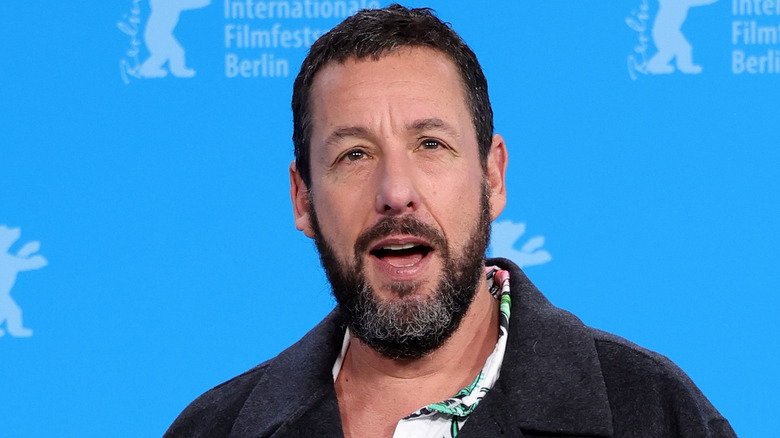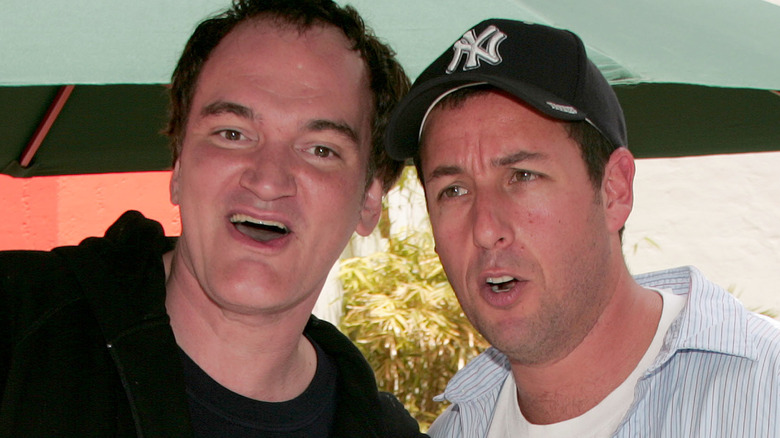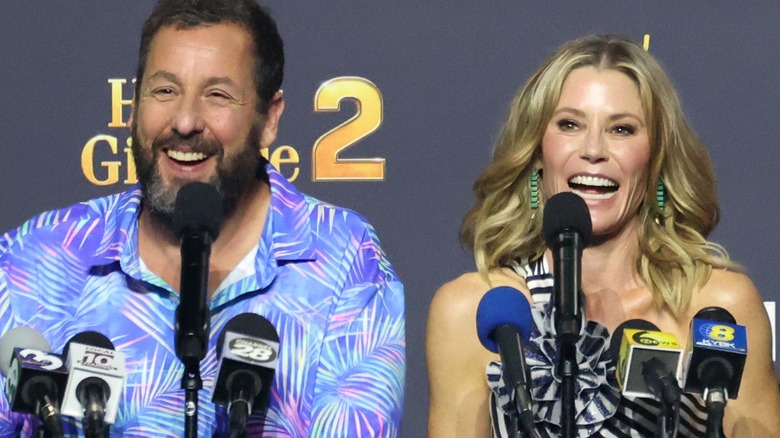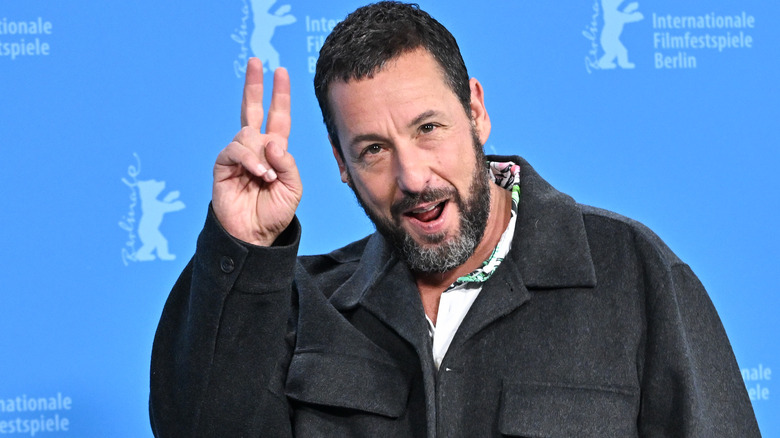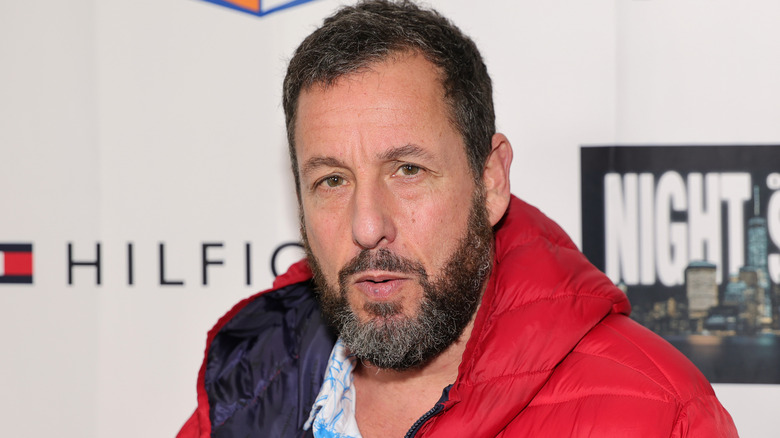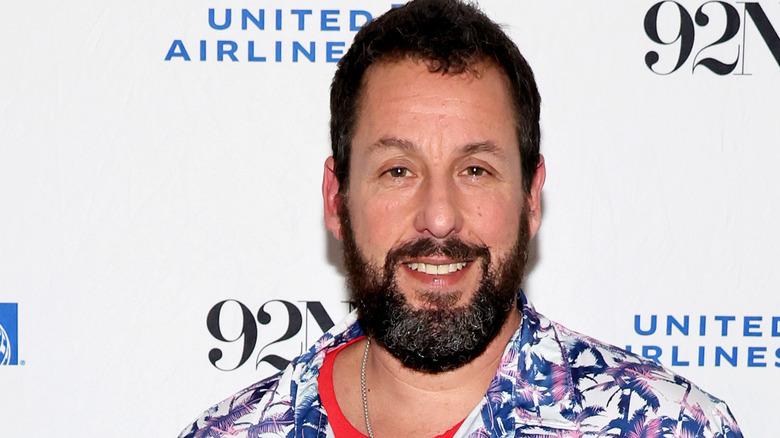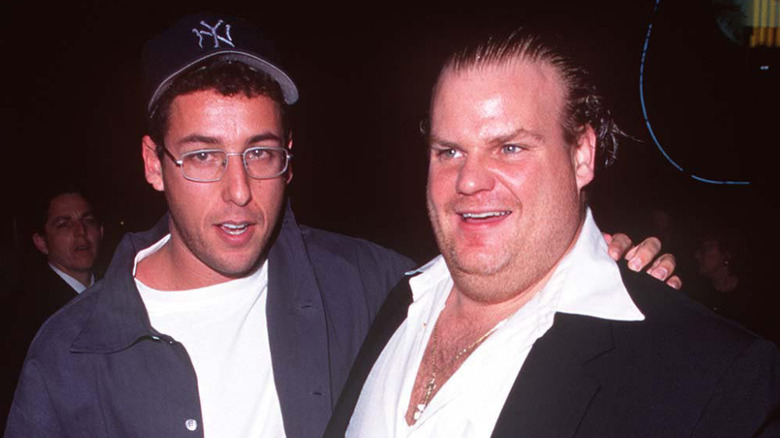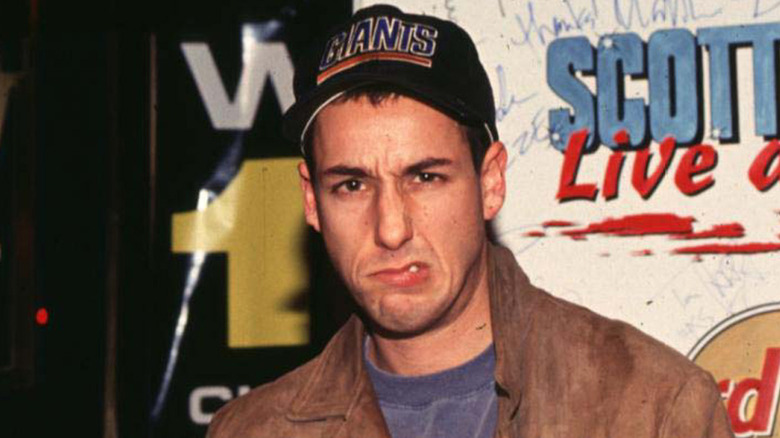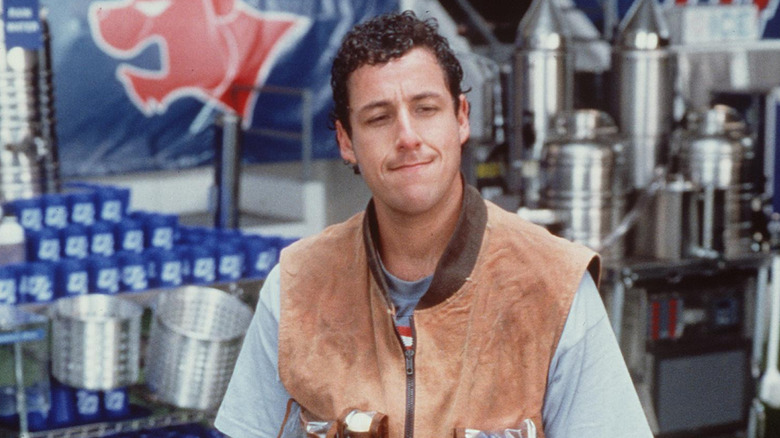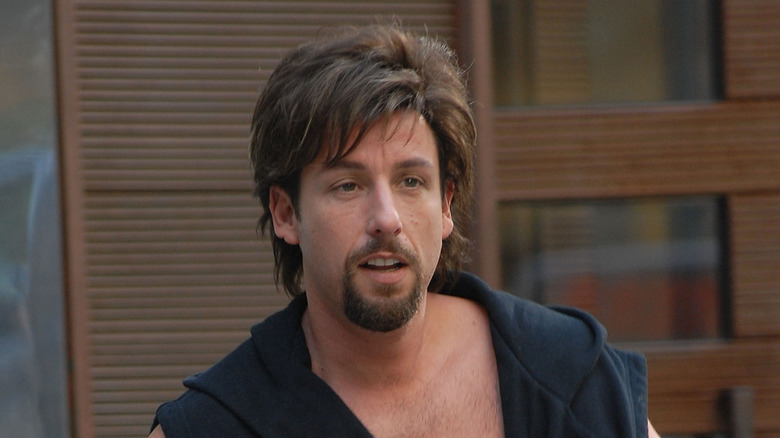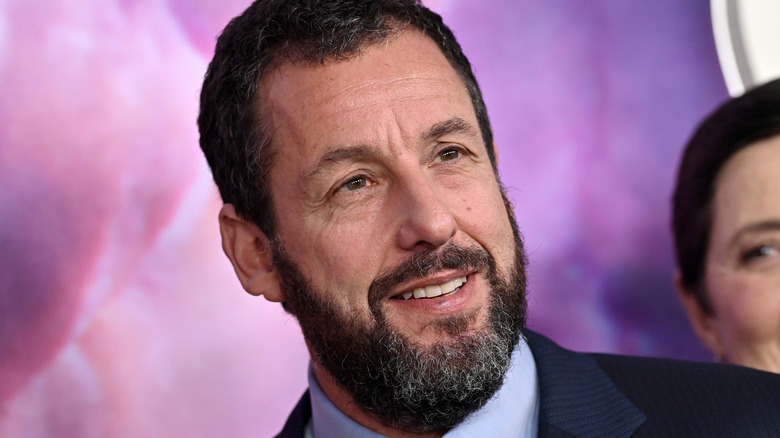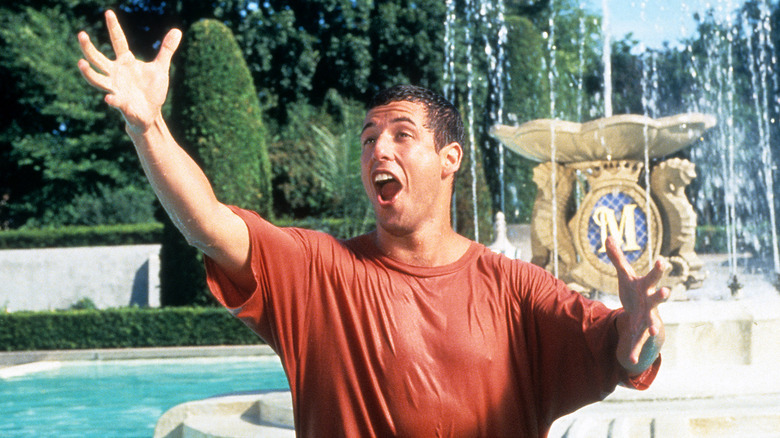The Hidden Truth Of Adam Sandler
One of the most popular and prolific screen comedians of all time, Adam Sandler has been giving millions of fans silly, laugh-out-loud movies with ridiculous characters and a lot of heart for three decades now. In addition to starring in some of the most talked about and controversial "SNL" sketches of all time, Sandler has made dozens of movies for theaters and streaming services. There's "Happy Gilmore," "The Waterboy," "Click," "Grown Ups," "Hotel Transylvania," "Murder Mystery," and "Hubie Halloween," and that doesn't even count his forays into dramatic material. He's also a polarizing figure, as his movies are generally loathed by critics and self-appointed tastemakers, who feel he's been stealing money from Hollywood forever.
It's hard for the public to get to know the real Sandler, as he's often deeply entrenched in one broad character or another. But dig a little deeper, and you might be surprised. Here's a look behind the scenes into the life of one of the biggest and most influential movie stars of all time, like it or not.
He could have starred in a lot of big movies
Throughout the 1990s and well into the 2000s, Adam Sandler was one of Hollywood's most bankable movie stars. His name on the marquee alone could draw in tens of millions of moviegoers, so when he began to branch out from broad comedies he co-wrote and produced himself into more dramatic or experimental territory, studios and filmmakers took interest. Many times over, Sandler was offered major roles in movies that became big commercial or critical hits, and they would have seen the actor playing against type. Ultimately, he turned them all down.
Michael Mann's 2004 thriller "Collateral" was originally called "The Last Domino," and it entered production with Sandler playing the hitman character eventually portrayed by Tom Cruise. James Mangold's 2010 action comedy "Knight and Day" also starred Cruise, but only after Sandler passed on the project six years earlier when it was being developed by a since-shuttered studio. And when writing his 2009 Oscar-nominated World War II revenge epic "Inglourious Basterds," Quentin Tarantino created the role of Sergeant Donny Donowitz, a gleefully violent Nazi-killing soldier nicknamed "The Bear Jew," in the hope that Sandler would play it. Unfortunately, Sandler had already committed to filming "Funny People" for his friend and collaborator, Judd Apatow.
He enjoys a mutual loyalty with his co-stars
From Adam Sandler's first major movie, 1995's "Billy Madison," he's surrounded himself with the preferred company of friends and comics. Over the last three decades, that loose collective of repertory players has grown from fellow "Saturday Night Live" cast members to include numerous up-and-coming and A-list actors. Sandler fans can almost always expect to see the likes of David Spade, Allen Covert, Kevin James, Steve Buscemi, and Dan Patrick pop up on screen.
Sandler is particularly and fiercely loyal to the women who have played the female leads in his films. Most notably Drew Barrymore, who acted opposite Sandler in the romantic comedies "The Wedding Singer," "50 First Dates," and "Blended." "We love each other," Sandler told "Entertainment Tonight" in explaining their chemistry. "Totally know each other. Know about each other." In 2011, he made the Netflix-dominating "Just Go With It" with Jennifer Aniston, their first of several pairings about 20 years after their friendship began. Sandler also made two "Happy Gilmore" films with Julie Bowen, one in 1996 before the latter was a massive TV star and one after "Modern Family" ended. "I didn't think they'd bring me back at all," she told the "Inside of You" podcast. "I mean, who am I supposed to be? He's got to have a younger woman in this one, 'Happy Gilmore 2.'" Sandler insisted on Bowen's return and called her "the heart of the movie."
He's made a few Hollywood enemies
Some comics just couldn't get on board with Adam Sandler. Andy Kindler, who is also a pointed and outspoken critic of his field, began his career around the same time as Sandler and actually used to like his contemporary's output. "I loved his stand-up," Kindler told LAist. "I loved his stuff on 'Saturday Night Live.' So many times I go after people that — on a certain level — I feel could be doing better, but for some reason decided to go with the money." When the news broke in 2024 that Sandler would make "Happy Gilmore 2," Kindler joked about it on X, formerly known as Twitter: "Before 'Grownups 9'? Just like the end of an NBA blowout it's GARBAGE TIME."
By the time Sandler began his 5th season on "Saturday Night Live" in 1994, the show brought in more cast members, including the very of-the-moment alternative comic and actor Janeane Garofalo. Before even one sketch aired, however, Garofalo told the New York Observer (via New York Magazine) that she didn't enjoy "SNL" in its current state, finding it "unwatchable." Elsewhere, she told a Canadian newspaper that Sandler's bits in particular were "childish." Sandler heard what Garofalo had said, and he ignored her backstage for weeks before chastising her for her comments. Garofalo ultimately left "SNL" after 14 episodes, rejecting the parts Sandler and his favored writers pitched to her on the grounds that she found them demeaning.
His Netflix deal was born out of scandal
Adam Sandler once enjoyed a mutually profitable arrangement with Sony Pictures. The film company distributed movies made by his production company, Happy Madison, and even gave that firm space on its studio lot. But Sony began to doubt its relationship with Sandler in the 2010s following the relatively poor box office showings of "Blended," "That's My Boy," and "Jack and Jill." When hackers broke into Sony's email archives and released them to the public in 2014, some of the documents revealed the extent of the studio's animosity toward Sandler. A meeting where he proposed $200 million for a "Candy Land" movie, based on one of the strangest board games to ever exist, went so poorly that one executive called him an "a******." In another message, a different higher-up called Sandler and his co-producers "such a*******" for trying to ask for more money to make "Hotel Transylvania 2."
Just weeks before the derogatory emails leaked, Sandler and Happy Madison left Sony for a four-movie deal with binge-watching encourager Netflix. He's since extended the arrangement, and he's now produced and/or starred in over a dozen movies for the biggest name in streaming. Looks like the move worked out for the better.
The Anger Management star had anger management issues
Back when he first emerged as an A-list movie star, Adam Sandler tended to play what was essentially the same role over and over again. Whether it was in comedies he produced himself or in dramas he made for other filmmakers, he was typically a man just barely hanging on to civility who eventually erupted into glorious rages. Among the movies in which Sandler's characters simmered, steamed, and then came unglued: "Happy Gilmore," "The Waterboy," "The Wedding Singer," "Eight Crazy Nights," and, not so ironically, "Anger Management." Younger Adam Sandler felt drawn to those parts — and even wrote them for himself as a kind of catharsis. Off-screen, he dealt with a serious case of imposter syndrome and feelings of unworthiness. "I just have a natural part of my brain that feels like I don't belong here," Sandler explained to the "Little Gold Men" podcast in 2022. "This feeling uncomfortable and loser stuff I've been doing for years, it's in me."
So what changed for the objectively successful superstar? He enrolled in therapy to acquire the tools to work through his issues. "I talk to a shrink sometimes," Sandler told AARP. "He's given me a plan. Sometimes just holding in a sentence, taking a beat for a minute before saying something stupid. I had a quick temper, quick reactions. I made a lot of dumb mistakes and said a lot of stupid things."
He's got a tumultuous history with SNL
Adam Sandler had a triumphant five-year run in which he put his comedic imprint on "Saturday Night Live." He left the show in 1995, right around the time his first starring vehicle, "Billy Madison," hit movie theaters. That feasibly led to a false fact about "SNL" you always thought was true: That Sandler walked away from "SNL" of his own volition. It's simply not true. Sandler, along with his close friend and frequent scene partner Chris Farley, were both fired from the show that had jumpstarted their careers and that they'd helped make into vital television. Sandler was simultaneously angry, hurt, and baffled by his termination. "I was hurt because I didn't know what else I was gonna do. ... Maybe I would've never left because I'm not good at saying goodbye. They had to get rid of me somehow," he told "The Howard Stern Show" in 2019.
Publicly, and for years, Sandler acted like he was angry at "SNL," but that was only to mask the sadness of being let go not by anyone directly connected with the show, but by an NBC executive who just didn't like Sandler's brand of comedy. It took Sandler 24 years to return to the sketch show, when he agreed to guest host an episode in 2019. For his show-opening monologue, Sandler performed an autobiographical funny song about his time on "SNL" called "I Was Fired."
It took him a while to break through
When Adam Sandler joined the cast of "Saturday Night Live" in 1990, he quickly broke out as one of the most impactful stars of his era of the late-night sketch comedy institution. Oddly, he was still an unknown entity to most viewers despite working regularly in popular films and TV shows. While still attending New York University's Tisch School of the Arts in 1987, Sandler landed his first on-screen role as Smitty, a friend of teenager Theo Huxtable, on "The Cosby Show." Sandler showed up in four episodes of the series, at the time the most-watched show on television.
It didn't lead to household name status, nor did a performance slot on the stand-up comedy show "Showtime at the Apollo" or a spot in the cast of MTV's cult classic game show "Remote Control." In the skits and bits laced through the late '80s program, Sandler portrayed a variety of dumb-guy characters, most notably "Stud Boy." It wasn't until he successfully auditioned for "SNL" that his career went to the next level.
He takes inspiration from real life
In 1998, Adam Sandler co-wrote "The Waterboy," in which he played Bobby Boucher, a dim-witted college football aide whose rage at being bullied gets channeled into tackling. "We were making an album," Sandler recalled to "Entertainment Tonight." "My buddy [Jonathan] Loughran was reading a 'Sports Illustrated' and talking about water boys. And then I had the idea of a guy, a water boy, who has a lot of rage inside, and he finally explodes and tackles somebody. And then we thought it would be fun to do a movie about a guy who, instead of a quarterback or a running back, a linebacker — the star of the movie is a guy who can tackle well."
For "Happy Gilmore," the story of a hot-headed hockey player turned golf pro, Sandler based the title character in part on Kyle McDonough. Sandler grew up with McDonough, who eventually went on to become a professional hockey player. "His father would take us golfing, and I could hit the ball further than they could, so they figured it was because of hockey," McDonough told British Ice Hockey. "It was his dad's idea that there was something funny in there, and Adam ran with it." Elsewhere, the vintage prank calls played at the beginning of "Funny People," a movie about a comedian directed by Judd Apatow, are real ones Sandler made in the early '90s, when Sandler and Apatow were roommates.
He was sued over allegedly stealing one of his screenplays
Adam Sandler's movies grew into increasingly high-concept and offbeat works in the 2000s, culminating with the 2008 goofy, politically charged action comedy "You Don't Mess with the Zohan." The plot: The title character, a legendarily effective counterterrorism asset, leaves a life of intrigue and violence with the Israeli agency Mossad behind to move to the United States and style hair. Sandler wrote the script with Robert Smigel and Judd Apatow, and they were all accused of stealing the concept and main character from a little-known comedy writer named Robert Cabell.
Cabrell had created and tried to market an internet cartoon based on Jayms Blonde, an original James Bond character he created: A Navy SEAL who becomes a hairdresser. In Cabrell's marketing materials for a Jayms Blonde series, the character brandishes a gun-hairdryer hybrid, much like how Zohan is depicted menacingly pointing a hairdryer on the "You Don't Mess with the Zohan" movie poster. Cabrell sued Sandler and his collaborators for idea theft and copyright infringement, claiming that a representative of Sandler's production company had once contacted him on MySpace about developing a Jayms Blonde project. The judge was skeptical of the whole case and dismissed it in 2011.
Adam Sandler has some brand new body parts
Adam Sandler spent most of 2022 on movie sets, shooting both the comedy "Murder Mystery 2" as well as the sci-fi psychological drama "Spaceman." Both films were physically demanding of its star — action sequences and deep-space floating, respectively — who chose to do his own stunts whenever possible. Well into his 50s at the time, Sandler wasn't as physically resilient as he once was, and he sustained an injury on one film that was made worse by the taxing shoot of the other film. "I did 'Spaceman,' and I was hanging in the harness all the time," he disclosed to Variety during the premiere of "Murder Mystery 2." "I kept saying, 'Something's going on with my hip, man. I'm in trouble. And then during this and this other movie I did, I was like, 'Yeah, I definitely gotta X-ray that thing,' and we were in trouble."
Very soon after he completed his work on "Murder Mystery 2," Sandler elected to have hip replacement surgery. "Everything's scary at 56 years old," he said. "You never know what the hell you're gonna get up from. I'm sluggy, man. My body hurts."
He was traumatized by reviews
Historically, Adam Sandler's films haven't impressed critics, and that goes all the way back to his first significant film, "Billy Madison." Critics delighted in trashing the comedy, like Roger Hurlburt of the South Florida Sun-Sentinel, who wrote, "A more moronic vehicle is hard to imagine." But comedians have feelings, and words can hurt. "I realized I'm going to be in the newspaper, that was a big deal," Sandler told The Washington Post about the lead-up to the release of "Billy Madison." "And then I read a couple reviews and I was like, 'Woof, that hurts,'" he added. After "Happy Gilmore" in 1996, Sandler vowed to stop reading reviews because they're too mean. "I invite all these amazing people I care about to make movies with me, and I wish they didn't have to read s*** about whatever we've made," Sandler told AARP in 2022.
Howard Stern's on-air critiques hit especially hard. "When I was at NYU freshman year, I loved you. That's why it was so weird when you used to slam me," Sandler said on Stern's show in 2015 (via Us Weekly), ready to receive an apology. "I always felt bad about all those years we didn't speak," Stern responded. "I really did because I was a total f****** a******." Now older and wiser, Sandler learned to effectively block out the negative noise. "I don't get too shook up," he told AARP, regarding reviews. "Maybe we shouldn't read this stuff because it's so harsh," he said during a Netflix conversation (per Entertainment Weekly).
